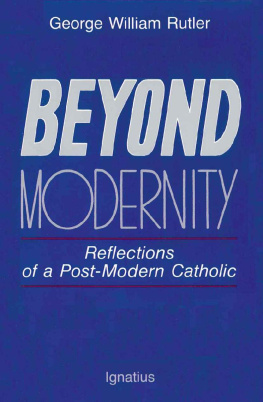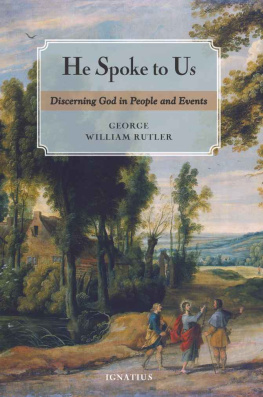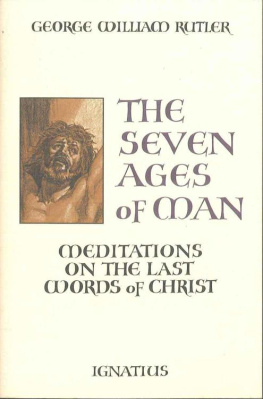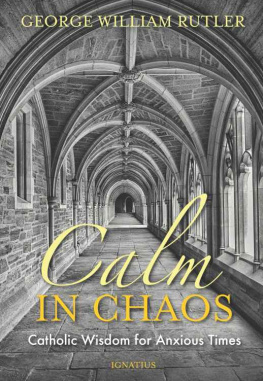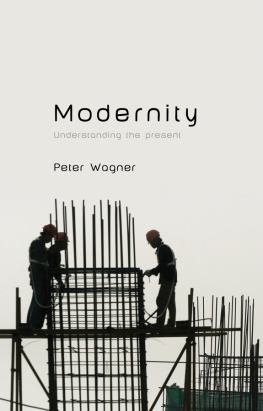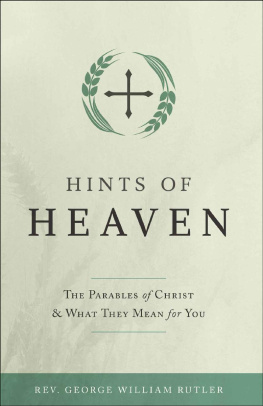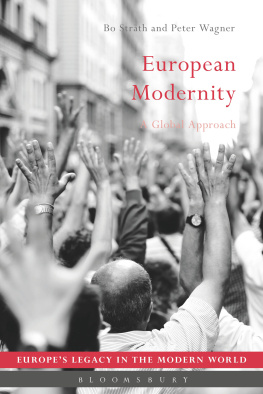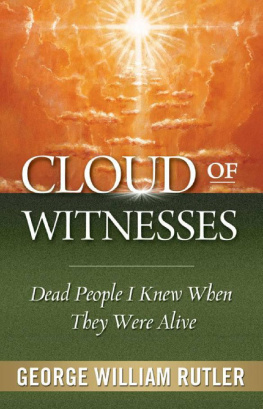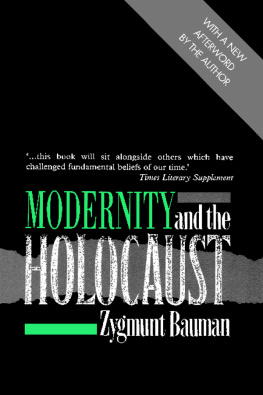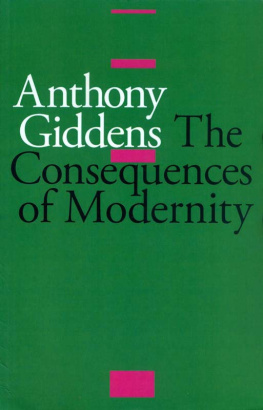BEYOND MODERNITY
BEYOND MODERNITY
Reflections of a Post-Modern Catholic
by
GEORGE WILLIAM RUTLER
IGNATIUS PRESS SAN FRANCISCO
Cover by Marcia Ryan
1987 Ignatius Press, San Francisco
All rights reserved
ISBN 978-0-89870-135-7 (PB)
ISBN 978-1-68149-056-4 (E)
Library of Congress Catalogue Number 86-82636
Printed in the United States of America
TABLE OF CONTENTS
ACKNOWLEDGMENTS
Some of the material in this book is based on lectures delivered to groups at Sarah Lawrence College, Columbia University, Princeton University, and the Catholic University of America. Several essays originally were published in separate form. The author and Ignatius Press express their gratitude, for permission to reprint these materials in the present book, to the following: Policy Review , the Human Life Review, Catholicism in Crisis , the New Oxford Review , the Homiletic and Pastoral Review , the Manresa Educational Corporation, the Cardinal Mindszenty Foundation, the Institute on Religious Life, and the Fellowship of Catholic Scholars. Statements by the President of the Johns Hopkins University in Chapter V are copyright 1985/86 by The New York Times Company. Reprinted by permission. Modern Times , copyright 1983 by Paul Johnson, is quoted with permission of Harper and Row Publishers, Inc.
The author also wishes to express his indebtedness to the Reverend Daniel C. Fives, S.S., and Monsignor Florence D. Cohalan.
I
BEYOND MODERNITY:
FACING THE TWENTY-FIRST CENTURY
The modern age is becoming outmoded, the thing it thought most unlikely. This poses a problem overwhelming to set minds: what happens when the age which was supposed to be the end of all the ages ends itself? The stark reply is, modern man is the least equipped to know. While posturing as the breath of things to come, he was instituting the first civilized denial of the future. Modernity is worse than a rejection of the past; it is a defiant avoidance of that which is next, probably the first school of discourse to cancel tomorrow as a thing as vapid as part of yesterday.
It is ungrateful to forget your last breath; it is suffocating to forget your next breath. And it is oppressively tedious. That is not an incidental problem: the modern age has established boredom as its typical form of death. In the process of setting astonishing records in science, as if life were becoming a succession of Worlds Fairs with confident Cities of the Future on display, modern life became a kind of record stuck in time. The prophets solemn announcement, Now is the hour, got worn down, so that his pale adverb had to do the work of his ruddy noun: Now is. Since the line had nowhere to go, it kept repeating itself. The prophecy became so redundant that the prophets began to call themselves mere existentialists.
Creation has a future; chance does not. The real futurists have been the archivists and evangelists who knew the difference between habits and plans, drawing with rabbinic sagacity a line between movements and progressions. The moderns, having abandoned the sense of Genesis, also lost the heart of the Apocalypse. The end of time became a thought too dreadful to think, something that might at most be intimated by the disappearance of thin snail darters and the appearance of pregnant mushroom clouds. One antidote illusion remained: that the twentieth century was not only the criterion of time, but was time altogether. If history were a scrap heap, the future would be a useless procrastination.
In that rarefied atmosphere, people thought there was something significant, even revolutionary, in the expression, I am me. Other ages, and one hopes they include the one to come, would say that such a statement is to philosophy what it is to grammar. But the twentieth century did manage to convince itself that it was something more riveting than a fulcrum, for it had no other references to balance or move; and it was even more than a zenith, for it had no legacy of a foundation. It was the very pinpoint of experience. Or so it seemed, for it had confused human essence and human existence. In its isolation from the human tradition, the modern mentality forgot this sharp and central fact: the essential human has his existence from God. The I is a thing received. For while each person is a unique entity, a first subject of attribution, each person is nonetheless subject to God by the fact of creation. If the created I does not also morally subject itself by an act of its free will to the Wholly Other who is the only I Am, then it endures the servility of a false existence. When the modern determinist declares, I am me, as though that sufficiently defied all that inhibits him, he is merely revealing frustration at not being the I Am. Without recourse to the unutterable name of God, man cannot even declare himself. Hence humans, who alone of all creatures are capable of an identity crisis, have in their modernity made the crisis a neurosis instead of a moment of revelation. The human mind that does not resolve itself, endlessly afflicts itself.
The affliction takes the form of thinking that your own age is the pinpoint of all viable circumstance and all verifiable truth. The problem for such a mind is this: angels can dance on a pinpoint but people cannot. What must be an exhilarating and expansive dance for pure intelligence (which is what angels are) must be a depressing and confining thing for intelligence obliged to reason (which is what humans are). The mediaeval schoolmen had figured this out, but from around the time of Comte and the modernist rumblings, people rather muddled it. In a symbolic sense, modern man was certain that no angels could dance for lack of legs, but that every human was engaged in dance because he was engaged in having legs. But as the modern dance did not seem very like what angels were supposed to do, modern man decided, as though by some common and unspoken intuition bending and abstracting his art and discourse, that all dances are meant to be sad and limited. The idea was as outdated as a pagan myth, for the pagans had already called such a dance a tragedy and had described it with violent and terrible beauty. The notion of the defeated dance has set the mood of outmoded moderns who are by now the most contradictory of philosophical derelicts.
To admit that human creatures are a little lower than the angels is prelude to knowing that they are crowned with glory and honor. Uncomfortable on the head of a pin, the essential man now is trying to assess his rightful place. He is possibly beginning to stretch his logic instead of his ego. At least he is beginning to accept that such a thing can happen; and that such a thing might even be good. He may even be awakening like a wrinkled giant from the hoary modern slumber which dreamed such odd illusions of cause and effect. In fitful modern nights, the most compulsive superstition seemed convincing; for it actually looked as though supernatural realities, such as the motivations behind the creation of the universe itself, have only natural causes; and that natural realities, such as human responsibility, have supernatural causes in the determinism of economic and psychological compulsions. In separating from God, the modern impulse became detached from itself: in theology the illusion came to be modernism. But the term modernity refers to the whole condition of alienated culture. It bespoke an ineffable melancholy in the midst of a magisterial Darwinism, more ready than human curiosity ever was to examine its origins and more uncertain than ever about its purpose. Matthew Arnolds vast chagrin at the long, withdrawing roar of the Sea of Faith, drifted from Dover Beach until it became the plaintive voice of the existentialist refused by the sea itself on every beach.
Next page
